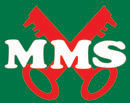Strategic Issues
1. Group Management and Institution Building
MMS believes in sustainable development and to achieve this objective it applies a method based either group formation or community participation approach in all of its projects /programmes.All group members are involved with institutions like saving and credit group, Programme beneficiary group, producer group, CBOs and federation.
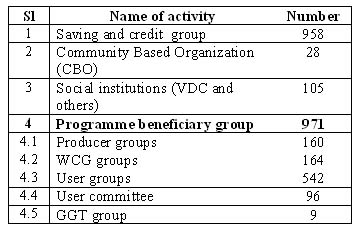
Group members are involved with Branch management committee, central federation and institutions where MMS provides supports to all social institutions as an umbrella. These primary group members are also participating in MMS general committee and Executive Committee.
Group management: MMS forms different types of groups as per project guideline those are led by elected president and secretary who meet in weekly or monthly meeting on regular basis. MMS coordinates with all these groups through projects and does advocacy with them to participate in local government activities as well as other service providing agencies for getting basic and quality services.
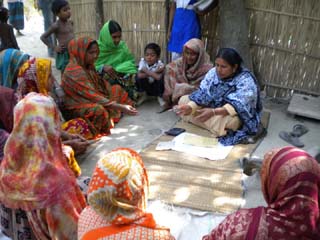 During reporting period total 2062 groups have been formed at different levels those helped to run the project smoothly i.e. organizing .people in a platform, message dissemination and alternative leadership development at grassroots level. These groups exist after the project implementation period and continue to contribute in sustainable development, sharing benefits and building communal harmony and relationships within the beneficiaries.
During reporting period total 2062 groups have been formed at different levels those helped to run the project smoothly i.e. organizing .people in a platform, message dissemination and alternative leadership development at grassroots level. These groups exist after the project implementation period and continue to contribute in sustainable development, sharing benefits and building communal harmony and relationships within the beneficiaries.
All the group members receive a series of life skills and capacity building training like agriculture, poultry, livestock rearing, gender and leadership which help them to get confidence to undertake any self employment initiative.
2. Climate Change Adaptation and Disaster Risk Reduction:
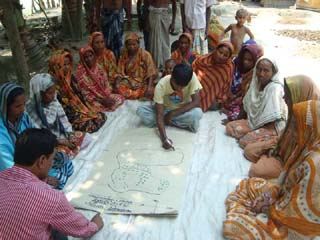 MMS is a specialized organization in the field of climate change adaptation and disaster risk reduction activities. The organization has contingency plan and it is updated on regular basis. It has emergency store and ware house. It has a good team, well equipped in prompt response like emergency search and rescue, emergency relief, rehabilitation and reconstruction activities. MMS is capable to response within 6-12 hours without help of others having declared emergency by the administration.
MMS is a specialized organization in the field of climate change adaptation and disaster risk reduction activities. The organization has contingency plan and it is updated on regular basis. It has emergency store and ware house. It has a good team, well equipped in prompt response like emergency search and rescue, emergency relief, rehabilitation and reconstruction activities. MMS is capable to response within 6-12 hours without help of others having declared emergency by the administration.
MMS has mainstreamed disaster and incorporated it in all policies, vision, mission, and structure of the organization as well as included into most of the ongoing projects as cross cutting issue.MMS has also capacity and working experience with disaster affected people in other districts within the country. MMS also participates and implements in national and international disaster risk reduction programmes in collaboration with government. MMS is a pre-qualified partner of WFP, UNDP and UNICEF for disaster and emergency response.
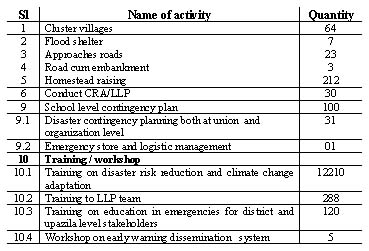 Climate change is a global and national issue in which Bangladesh is an innocent victim. Sirajgonj is one of the most vulnerable and disaster prone areas in the northern part of Bangladesh. Flooding, river erosion, drought and cold weave are common phenomena in this area. As a result of climate change, the frequency and severity of disasters are increasing, which severely affect on livelihoods, public assets and other resources. In consequence, both poverty and vulnerability increased and overall development becomes stopped.
Climate change is a global and national issue in which Bangladesh is an innocent victim. Sirajgonj is one of the most vulnerable and disaster prone areas in the northern part of Bangladesh. Flooding, river erosion, drought and cold weave are common phenomena in this area. As a result of climate change, the frequency and severity of disasters are increasing, which severely affect on livelihoods, public assets and other resources. In consequence, both poverty and vulnerability increased and overall development becomes stopped.
Preparedness and emergency stock at family and community level: MMS places an emphasis on disaster preparedness at both family and community level. As a part of this, MMS conducted Community Risk Assessments (CRA) /LLP under V2R, CCADRR, ER, REECALL and DIPECHO-V projects as well as organize validation workshop with active participation of respective UPs and line departments. In reporting period through conducting CRA/LLP, community annual development plans have been prepared in 30 unions. Local government has been motivated to develop their annual plan considering union development plan. Community people has been motivated to prepare disaster risk reduction and climate change adaptation so that they can cope up with disaster and vulnerability themselves.
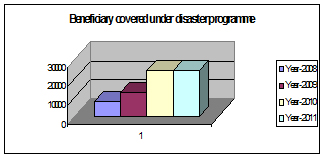
3. Agriculture & Livestock
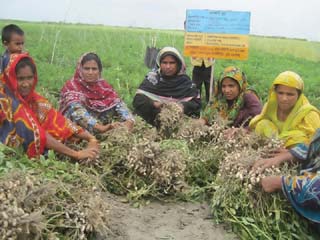 Sirajganj is geographically situated on the bank of the river Jamuna and in the historical Chalan Beel.As a result of annual flooding and rainfall, the land is generally very fertile. People are traditionally involved with agriculture and livestock activities but they do not have adequate knowledge on modern agricultural technology. Considering this MMS emphasized on providing modern technology and input supports to targeted beneficiaries which increased both knowledge and production skill of project participants.
Sirajganj is geographically situated on the bank of the river Jamuna and in the historical Chalan Beel.As a result of annual flooding and rainfall, the land is generally very fertile. People are traditionally involved with agriculture and livestock activities but they do not have adequate knowledge on modern agricultural technology. Considering this MMS emphasized on providing modern technology and input supports to targeted beneficiaries which increased both knowledge and production skill of project participants.
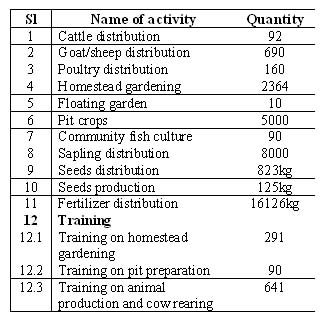 In reporting period MMS implemented different projects like Sustainable Soil Management for Food Security of Poor, Marginal and Small Farmers of Active Flood Plain and Charlands of Bangladesh (SUSFER), Development Initiatives for Sustainable Households Activities in Riverine Island (DISHARI), Assistance to Local Communities on Climate Change Adaptation and Disaster Risk Reduction in Bangladesh (CCADRR), and Vulnerability to Resilience and Resilience through Economic Empowerment and Climate Adaptation, Leadership, Learning-REECALL .These projects specially focused on food security and livelihoods.
In reporting period MMS implemented different projects like Sustainable Soil Management for Food Security of Poor, Marginal and Small Farmers of Active Flood Plain and Charlands of Bangladesh (SUSFER), Development Initiatives for Sustainable Households Activities in Riverine Island (DISHARI), Assistance to Local Communities on Climate Change Adaptation and Disaster Risk Reduction in Bangladesh (CCADRR), and Vulnerability to Resilience and Resilience through Economic Empowerment and Climate Adaptation, Leadership, Learning-REECALL .These projects specially focused on food security and livelihoods.
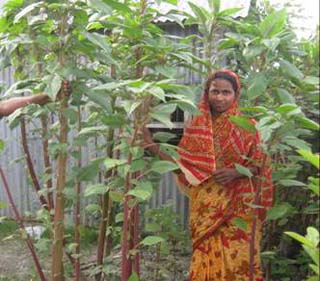 After having the knowledge and know-how, all of the target beneficiaries of the projects involved in
After having the knowledge and know-how, all of the target beneficiaries of the projects involved in 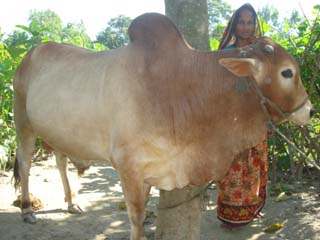 productive activities like homestead gardening, village model farm development, and vegetable, seedling; sapling and seed production. Beneficiaries also received a series of training sessions on homestead gardening, nursery development, nutrition education, seed production and preservation. As a result of these activities, family income has been increased by selling the surplus of crops. Intake of micro-nutrient has been increased in food. All these have made positive impact on increased women involvement in productive activities, as well as their access to the decision making process at family level – something especially important in the development of female empowerment at the home and community level. In addition of vegetable production and nutrition education 82688 different types of saplings, 125kg seeds have been produced during the reporting period.
productive activities like homestead gardening, village model farm development, and vegetable, seedling; sapling and seed production. Beneficiaries also received a series of training sessions on homestead gardening, nursery development, nutrition education, seed production and preservation. As a result of these activities, family income has been increased by selling the surplus of crops. Intake of micro-nutrient has been increased in food. All these have made positive impact on increased women involvement in productive activities, as well as their access to the decision making process at family level – something especially important in the development of female empowerment at the home and community level. In addition of vegetable production and nutrition education 82688 different types of saplings, 125kg seeds have been produced during the reporting period.
4. Women Empowerment
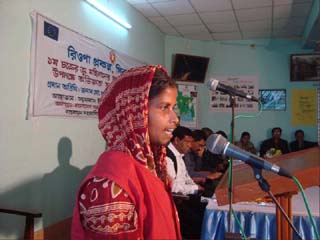 Gender and women empowerment has been mainstreamed and incorporated as cross cutting issue in all projects.
Gender and women empowerment has been mainstreamed and incorporated as cross cutting issue in all projects. 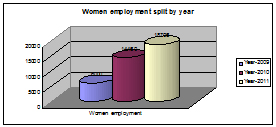 To ensure this, MMS has promoted skilled and efficient female staff in senior management, mid-level and field level as well as in both general body and executive committee of the organization.
To ensure this, MMS has promoted skilled and efficient female staff in senior management, mid-level and field level as well as in both general body and executive committee of the organization.
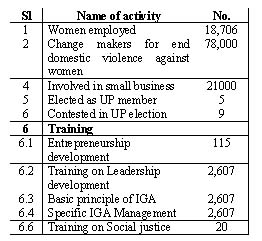
MMS also emphasized to end domestic violence against women and aimed to enlist 78000 change makers at different levels like students, housewives, teachers, social elites and professional. They have organized human chain, press conference and campaign at different levels which reduced physical and mental torture at satisfactory level among targeted community. MMS specially focused on women empowerment with a view to increase their access to decision making process at family level, as well as to increase dignity in society and also recognize their ownership to domestic assets.
5. Primary Health Care and Family Planning
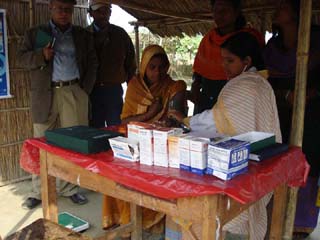 Sirajganj is the most poverty stricken area in the northern part of Bangladesh, situated on bank of river Jamuna. Communication is very poor and during disaster these areas become much more vulnerable.
Sirajganj is the most poverty stricken area in the northern part of Bangladesh, situated on bank of river Jamuna. Communication is very poor and during disaster these areas become much more vulnerable.
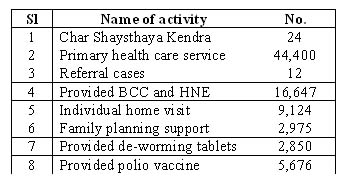 The general health situation in these areas is very bad. A large number of mothers and children die during birth or in post delivery stage due to poor health and transportation facilities. In many cases, patients die on the way to upazila and district health clinics or hospitals. Almost 100% of birth delivery occurs in the home with the support of Traditional Birth Attendants (TBAs).Unfortunately, many of the TBAs of the Chars area have no formal training which increases the risk for mothers and babies. As a result of inefficient or ill-informed practices, a number of children are also born with disabilities which affect them for the rest of their lives.
The general health situation in these areas is very bad. A large number of mothers and children die during birth or in post delivery stage due to poor health and transportation facilities. In many cases, patients die on the way to upazila and district health clinics or hospitals. Almost 100% of birth delivery occurs in the home with the support of Traditional Birth Attendants (TBAs).Unfortunately, many of the TBAs of the Chars area have no formal training which increases the risk for mothers and babies. As a result of inefficient or ill-informed practices, a number of children are also born with disabilities which affect them for the rest of their lives.
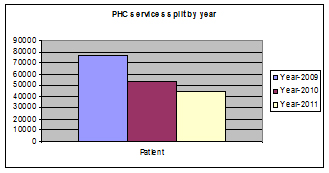 MMS specially focus on char dwellers’ health and family planning issue and considering the health hazards in remotest char lands MMS has been implementing PHC and Family planning project with technical and financial assistance of CLP. Under PHC&FP project MMS provides outdoor primary health care and family planning services through 24 satellite clinics on fortnightly basis, those are conducted by skilled and efficient paramedics and a group of trained Char Shaysthaya Karmi. The Project participants gather at satellite clinics on scheduled dates and get services. They get health services by paying a nominal fee of Taka ……. In addition, necessary medicine and family planning materials are available at CSKs and char people can collect medicine and contraceptive from CSK on reasonable price.
MMS specially focus on char dwellers’ health and family planning issue and considering the health hazards in remotest char lands MMS has been implementing PHC and Family planning project with technical and financial assistance of CLP. Under PHC&FP project MMS provides outdoor primary health care and family planning services through 24 satellite clinics on fortnightly basis, those are conducted by skilled and efficient paramedics and a group of trained Char Shaysthaya Karmi. The Project participants gather at satellite clinics on scheduled dates and get services. They get health services by paying a nominal fee of Taka ……. In addition, necessary medicine and family planning materials are available at CSKs and char people can collect medicine and contraceptive from CSK on reasonable price.
In severe cases the patients are referred to nearest MMS nominated hospital or clinic for better treatment and the cost are borne from the project as per contract. During emergency MMS also forms mobile medical team along with emergency drugs for providing quick health services to the affected people.
6. Water and Sanitation
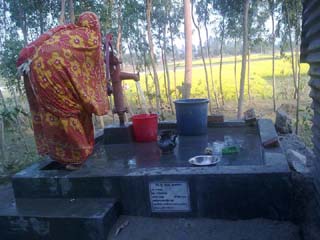 Water and sanitation coverage is not at satisfactory level in MMS working area. Around 40% people still lives out of sanitation coverage. They defecate on open space and most of them use river water for drinking, bathing, washing and other domestic purposes which is alarming for overall community health. To improve this situation MMS has been implementing different types of projects like Chars Livelihoods Programme (CLP), Assistance to Local Communities on Climate Change Adaptation and Disaster Risk Reduction in Bangladesh (CCADRR) with the assistance of ActionAid Bangladesh,
Water and sanitation coverage is not at satisfactory level in MMS working area. Around 40% people still lives out of sanitation coverage. They defecate on open space and most of them use river water for drinking, bathing, washing and other domestic purposes which is alarming for overall community health. To improve this situation MMS has been implementing different types of projects like Chars Livelihoods Programme (CLP), Assistance to Local Communities on Climate Change Adaptation and Disaster Risk Reduction in Bangladesh (CCADRR) with the assistance of ActionAid Bangladesh, 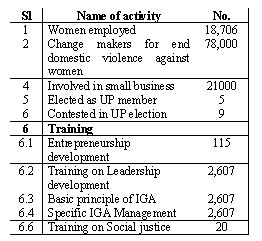 Resilience through Economic Empowerment and Climate Adaptation, Leadership, Learning (REECALL) funded by Oxfam-GB and Vulnerability to Resilience (V2R) with assistance of Practical Action Bangladesh. As outcome of multi-type interventions of those projects, presently 90% of the target beneficiaries are using sanitary latrines. Instead of using pond and river water they use tube-well water for drinking and other domestic purposes.
Resilience through Economic Empowerment and Climate Adaptation, Leadership, Learning (REECALL) funded by Oxfam-GB and Vulnerability to Resilience (V2R) with assistance of Practical Action Bangladesh. As outcome of multi-type interventions of those projects, presently 90% of the target beneficiaries are using sanitary latrines. Instead of using pond and river water they use tube-well water for drinking and other domestic purposes.
They are also much more aware now regarding personal health and hygiene.
7. Education, training and HRD
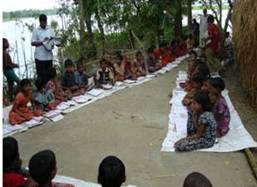 There are governments and registered primary schools in MMS working area but those are located in the remotest and hard to reach area. Most of the schools are led by one or two teachers which seems one of the major causes for poor education in char area. Considering the situation MMS started 10 non-formal primary education centers where 300 students successfully completed their primary education and about 60% of them are continuing both secondary and higher education. Recently MMS has started another 10 non-formal primary schools with the assistance of MMS own fund where another 300 drop out students are enrolled for having their primary education.
There are governments and registered primary schools in MMS working area but those are located in the remotest and hard to reach area. Most of the schools are led by one or two teachers which seems one of the major causes for poor education in char area. Considering the situation MMS started 10 non-formal primary education centers where 300 students successfully completed their primary education and about 60% of them are continuing both secondary and higher education. Recently MMS has started another 10 non-formal primary schools with the assistance of MMS own fund where another 300 drop out students are enrolled for having their primary education.
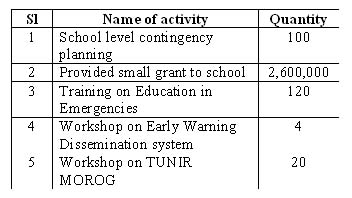 During disaster most of the educational institutions of the area become severely affected along with damage of logistics (both reading and writing materials) ,some of those are declared abundant and those remain usable, are used as flood shelters. As a result of deadly flood (usually visits at least for once in 2 years time) education becomes stopped for 2-3 months. Considering this situation MMS has been implementing Education in Emergency project with technical and financial assistance of Save the Children UK. Under this Project capacity of local administration, NGOs and social workers on humanitarian assistance has beenbuilt. The key elements of the project are to train up and sensitize government and non-government officials, develop data base for vulnerable schools, school based contingency planning with active participation of teachers, SMC members and students, and small grant for continuation of education in emergency. During reporting period most vulnerable and flood affected schools of the area (four upazilas) were identified, 100 school level contingency plans have been prepared and Taka 2600000 have been distributed among the institutions.
During disaster most of the educational institutions of the area become severely affected along with damage of logistics (both reading and writing materials) ,some of those are declared abundant and those remain usable, are used as flood shelters. As a result of deadly flood (usually visits at least for once in 2 years time) education becomes stopped for 2-3 months. Considering this situation MMS has been implementing Education in Emergency project with technical and financial assistance of Save the Children UK. Under this Project capacity of local administration, NGOs and social workers on humanitarian assistance has beenbuilt. The key elements of the project are to train up and sensitize government and non-government officials, develop data base for vulnerable schools, school based contingency planning with active participation of teachers, SMC members and students, and small grant for continuation of education in emergency. During reporting period most vulnerable and flood affected schools of the area (four upazilas) were identified, 100 school level contingency plans have been prepared and Taka 2600000 have been distributed among the institutions.
8. Income Generating Program
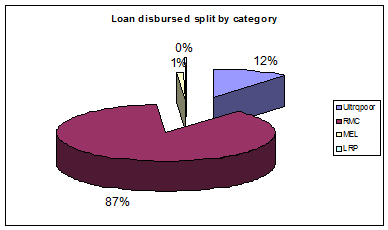 MMS specially implements Income Generating Program(IGP) in a very remotest and hard to reach area where other organization did not work.
MMS specially implements Income Generating Program(IGP) in a very remotest and hard to reach area where other organization did not work.
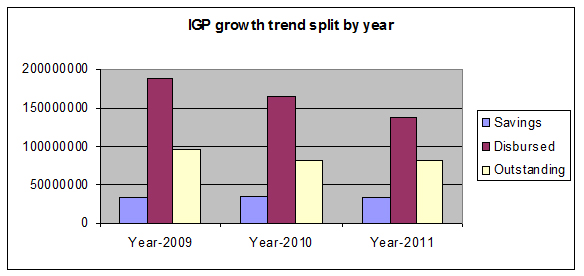 The IGP is a core program of MMS which has been implemented since 1991 with the aim of poverty alleviation through the creation of self-employment opportunities, as well as the reduction of gender discrimination, and the creation of empowerment through heightened awareness. MMS started the IGP programme with its own resources. It has since expanded with the technical and financial assistance of PKSF. The ultimate goal is to reduce poverty, facilitate the fulfillment of the basic needs of the poor community, and to bring about the equal participation in social and financial activities of women and men. During the past year, 976 groups have been formed with poor, hardcore poor and marginal farmers where 17173 female and 150 male members are led by a president and secretary who are elected by membership vote for the period of two years. For smooth programme implementation, a series of life-skills and capacity building training activities have been provided to the target beneficiaries as well as motivation to generate savings and the provision of micro-credit supports for IGA.
The IGP is a core program of MMS which has been implemented since 1991 with the aim of poverty alleviation through the creation of self-employment opportunities, as well as the reduction of gender discrimination, and the creation of empowerment through heightened awareness. MMS started the IGP programme with its own resources. It has since expanded with the technical and financial assistance of PKSF. The ultimate goal is to reduce poverty, facilitate the fulfillment of the basic needs of the poor community, and to bring about the equal participation in social and financial activities of women and men. During the past year, 976 groups have been formed with poor, hardcore poor and marginal farmers where 17173 female and 150 male members are led by a president and secretary who are elected by membership vote for the period of two years. For smooth programme implementation, a series of life-skills and capacity building training activities have been provided to the target beneficiaries as well as motivation to generate savings and the provision of micro-credit supports for IGA.
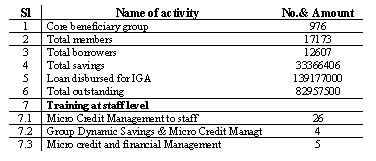 Considering the needs/demands of target beneficiaries, different forms of credit programme have been developed. These include the Ultra Poor Program (UPP), the Rural Micro-credit Program (RMC) and the Micro-Enterprise Loan (MEL). During the reporting period BDT 33366406 has been deposited as group savings by 976 groups, BDT 139177000 has been disbursed among 12607 borrowers and as of June 30, 2011 BDT 82957500 is remaining at field as outstanding. The IGP has been implemented in Chowhali, Shahjadpur, Belkuchi and Sadar Upazila of Sirajganj district, and Tangail Sadar and Nagorpur Upazila in Tangail district through eight branch offices of the organization. The loan recovery and saving collection rate is 99% which is satisfactory
Considering the needs/demands of target beneficiaries, different forms of credit programme have been developed. These include the Ultra Poor Program (UPP), the Rural Micro-credit Program (RMC) and the Micro-Enterprise Loan (MEL). During the reporting period BDT 33366406 has been deposited as group savings by 976 groups, BDT 139177000 has been disbursed among 12607 borrowers and as of June 30, 2011 BDT 82957500 is remaining at field as outstanding. The IGP has been implemented in Chowhali, Shahjadpur, Belkuchi and Sadar Upazila of Sirajganj district, and Tangail Sadar and Nagorpur Upazila in Tangail district through eight branch offices of the organization. The loan recovery and saving collection rate is 99% which is satisfactory
9. Acid Survivors and Persons with Disabilities Development
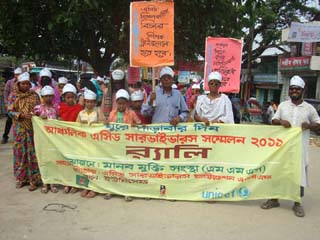 Sirajganj is remaining at the highest in acid violence in the country due to easy availability of acid, because Sirajganj is famous for looms where acid is used for dying thread as well as in jewelry shops. Acid violence is one of the most fatal terrorism which may turn off a cheerful life in a moment even may paralyze a family. On the other hand, there is a strong law against acid violence but those have no proper application due to undue influence of the social elites, bribery and insincerity of police administration.
Sirajganj is remaining at the highest in acid violence in the country due to easy availability of acid, because Sirajganj is famous for looms where acid is used for dying thread as well as in jewelry shops. Acid violence is one of the most fatal terrorism which may turn off a cheerful life in a moment even may paralyze a family. On the other hand, there is a strong law against acid violence but those have no proper application due to undue influence of the social elites, bribery and insincerity of police administration.
Considering the situation MMS has come forward to reduce and prevent acid violence and has been implementing Strengthening Psychosocial Services for Survivors of Acid Attack (SPSSAA) project with technical and financial assistance of Acid Survivors Foundation. During reporting period a total of 166 acid survivors were enlisted in Sirajgonj district and provided medical support along with psychosocial treatment to acid survivors through satellite clinic as well as given legal aid. As part of advocacy with local administration, social elites and journalist workshop and seminar were organized both at local and national level. In addition, 26 acid survivors were rehabilitated by which each has been given Taka 25000 -30000 and a total of taka 780000 has been disbursed among the acid survivors.
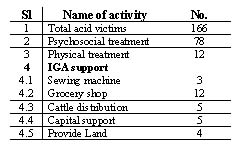 MMS is very much concerned for persons with disabilities (PWD). because according to report of WHO 10% people are disable of total population who are burden to the nation. The PWD lives very miserable life. They are severely neglected both at family and society. Considering this PWDs are given high priority during target beneficiary selection in all projects/programmes of MMS including disaster risk reduction, emergency response and rehabilitation. During reporting period total 1675 PWDs have been identified who have disabilities with physical, visual, hearing and sensorial and they were given both software and hardware support as per project nature. During post flood rehabilitation phase assistive device along with accessible home were distributed among PWDs with technical and financial assistance of Handicap international.
MMS is very much concerned for persons with disabilities (PWD). because according to report of WHO 10% people are disable of total population who are burden to the nation. The PWD lives very miserable life. They are severely neglected both at family and society. Considering this PWDs are given high priority during target beneficiary selection in all projects/programmes of MMS including disaster risk reduction, emergency response and rehabilitation. During reporting period total 1675 PWDs have been identified who have disabilities with physical, visual, hearing and sensorial and they were given both software and hardware support as per project nature. During post flood rehabilitation phase assistive device along with accessible home were distributed among PWDs with technical and financial assistance of Handicap international.
